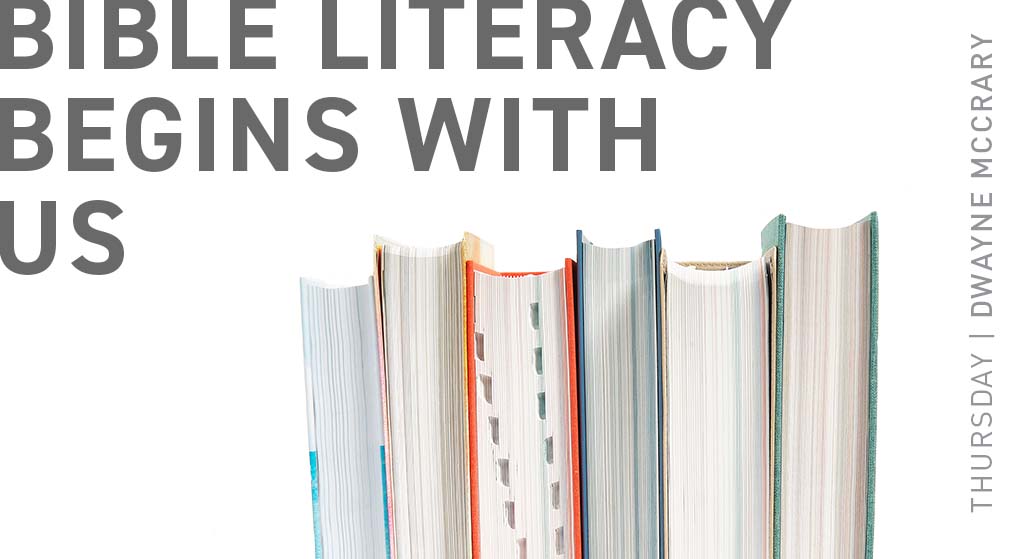In a recent Lifeway Research poll, 53% of those polled said they could tell the Christmas story accurately. Let that sink in for a moment. Nearly half felt they could tell the biblical Christmas story, getting most of the details right. But half could not. Most of us are not surprised by this even with all the emphasis given to Christmas in general. Think about all the opportunities we had to at least hear the Bible story during the month of December. Pageants, television specials, live nativity scenes, and church programs gave us reminders of the details. At the same time, we had tons of other stories being told to us that had very little to do with the birth of Jesus. If only half can tell the Christmas story with some accuracy, what about stories about Moses, Joshua, David, Elijah, and Hosea?
Before we start talking about “them,” let’s focus on us for a moment. We want people to read the Bible and know the stories. But what about us? How literate are we ourselves? Could we be part of the problem by failing to continue to invest our time in reading the Bible with an intentional plan. Most of us who teach read part of the Bible weekly–at least fifteen verses–but do we have an intentional plan to read all of it by a specific time? These questions led to more questions for us as leaders.
What is our Bible reading plan for 2022? If anyone should have a plan for reading every verse of the Bible in 2022, it should be us leaders. The CSB website includes several reading plans that could be used. The Day-By-Day Chronological Bible might be another option. Other sources may be turned to as well. The point is we can find a plan…if we want to.
What keeps us from reading through the Bible at least once a year? Reading through the Bible annually can seem like an impossible task. After all, there are 66 books and 1,189 chapters. Several websites claim that the Bible can be read in 75 hours or less (some claim we can do it 70 hours). Let’s give ourselves some grace and go with 80 hours. If we do the math, that is just a little over 13 minutes of time a day.
What is our goal or purpose for reading the Bible at least once a year? We may just pick up the Bible and start reading with no clear direction in mind, but most will find it helpful to read with a purpose. We may read through the Bible looking for times a certain word, phrase, or concept is noted. We may be looking for connections and elements that unify the different books. Some type of goal or purpose beyond simply getting to Revelation 22 may help us not only complete the reading but give us a different motivation for doing so.
What kind of journal or note taking system do we have in place? If we are going to read on purpose, looking for themes, use of a phrase or concept, or some other purpose, keeping a journal or notes will help us. Writing about what we discover helps us process the discoveries as well as remember them. We can also more easily look back at the notes and get a sense of what God may be wanting us to discover through the reading process.
Who else can we bring with us on this journey? Ezra set the standard as he declared that he dedicated himself to studying, obeying, and teaching God’s Word (Ezra 7:10). The order is important. We need to study and live it before we can teach it. But if we study and obey, we also need to teach what we have learned to someone. All three are needed for us to fully mature as a disciple of Jesus. We will want to take others with us on this journey so we can compare notes, sharpen each other, and share what we have learned.
How do we let others know what we are reading without sounding arrogant or prideful? One way of encouraging others is to share what we learn along the way. But we want to be humble in the process. When we are teaching a class or group, we may use what we are reading in a daily reading to illustrate a point connected to what our class or group is studying. Simply noting that we found this connection between the two while reading this past week is sufficient.
What other actions might we take to lead the way for others to begin reading the Bible annually?
Explore the Bible is designed to help address biblical literacy. The resources helps Sunday School classes and other weekly Bible study groups or all ages become familiar with key passages in each Bible book. Get free preview lessons.
